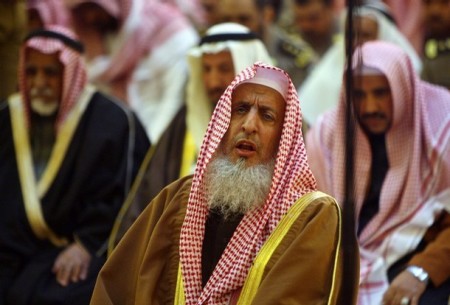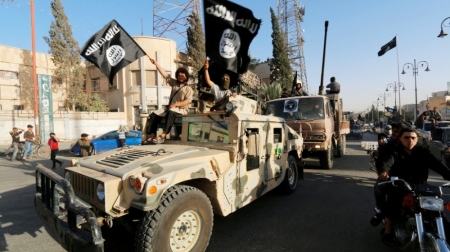Is Saudi Arabia as Bad as ISIS? Kingdom's Harsh Capital Punishment Rivals Terror Group, Says Middle East News Site

Saudi Arabia and the Islamic State terrorist group have a nearly identical justice system in their interpretation of Shariah law and the use of capital punishment, according to a Middle Eastern news site.
Known as Middle East Eye, the news site posted a chart on Twitter Tuesday noting the similarities between the legal code of the Saudi Kingdom and ISIS.
"Documents show IS & Saudi Arabia prescribe near-identical punishments for crimes," Middle East Eye tweeted.
This included both entities giving death by stoning for adultery by someone who is married, the death penalty for treason, murder, blasphemy or homosexuality, and the amputation of a hand and a foot for banditry.
A few differences included the punishment for slander and drinking alcohol; whereas ISIS mandates 80 lashes, Saudi law states that punishment is at the judge's discretion.
The Christian Post reported Wednesday that following the sentencing of Saudi Arabian blogger Raif Badawi, who was sentenced to 10 years in prison and 1,000 lashes for insulting his country's clerics, Conservative Princeton University professor and vice chairman of the U.S. Commission on International Religious Freedom Robert P. George, along with six other advocates, have offered to take 100 lashes each for the blogger.
Badawi got his first 50 lashes by cane in a public square just over a week ago. A news release from Amnesty International explained that a second round of flogging for the blogger was postponed last Friday because his wounds from the first flogging hadn't healed.
"Not only does this postponement on health grounds expose the utter brutality of this punishment, it underlines its outrageous inhumanity. The notion that Raif Badawi must be allowed to heal so that he can suffer this cruel punishment again and again is macabre and outrageous. Flogging should not be carried out under any circumstances," said Said Boumedouha, Amnesty International's deputy director for the Middle East and North Africa Program in the release.
In an email to The Christian Post Wednesday, Professor George confirmed that he and other advocates have offered to take the lashes for Badawi.
"Together with six colleagues on the U.S. Commission on International Religious Freedom, I sent a letter to the Saudi Ambassador to the U.S. calling on the Saudi government to stop the horrific torture of Raif Badawi — an advocate of religious freedom and freedom of expression in the Saudi Kingdom," wrote George.
"If the Saudi government refuses, we each asked to take 100 of Mr. Badawi's lashes so that we could suffer with him. The seven of us include Republicans and Democrats, liberals and conservatives, Christians, Jews, and a Muslim," he added.

Middle East Eye's sources included a document released last month on Islamic State penal code, noted the Washington, D.C.-based group the Middle East Media Research Institute.
"ISIS said it published the document as a warning and a reminder to the people living under its rule. It also reaffirmed its commitment to enforce it vigilantly," stated MEMRI.
Formed out of an al-Qaeda affiliate in 2013 and led by Abu Bakr al-Baghdadi, ISIS garnered international attention for its military victories and horrid atrocities.
Occupying large amounts of territory in Syria and Iraq, ISIS is known for its violent treatment of religious minorities and various Muslims sects.
While the legal codes bear resemblance, Saudi Arabia's religious leadership has denounced the Islamic State and its activities.
Last August Saudi Grand Mufti Sheikh Abdul Aziz al-Sheikh, the top religious official in the Islamic Kingdom, released a statement condemning ISIS.
"Extremist and militant ideas and terrorism which spread decay on earth, destroying human civilization," said al-Sheikh, "are not in any way part of Islam, but are enemy number one of Islam, and Muslims are their first victims."
Upon reporting of al-Sheikh's words against ISIS, Reuters noted the ideological and legal similarities between the two entities.
"Although senior Wahhabi clerics endorse execution by beheading for offenses that include apostasy, adultery and sorcery, oppose women driving or working and describe Shiites as heretics, they differ from al-Qaeda and Islamic State militants in opposing violent revolt," noted Reuters.
"Riyadh has been a main supporter of rebels battling Syrian President Bashar al-Assad, but has funneled arms and money away from Islamic State and al-Qaeda toward other opposition groups."
As Middle East Eye's report garners attention, Saudi Arabia has undertaken an effort to construct a 600-mile long wall between the Kingdom and its border with Iraq.
Planned in part to counter the ISIS threat, the border fence will have five layers of barbed wire fencing, a patrol road, a ditch, 240 rapid response vehicles, underground motion sensors, 40 watchtowers, day/night cameras, radar, seven command centers, 28 communication towers, 32 military response stations, and three rapid intervention teams.





















